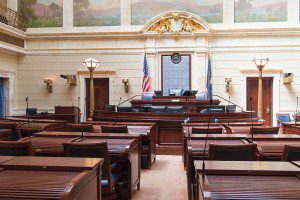
(Wikimedia Commons; click to enlarge)
I had the unique and enjoyable opportunity this morning of offering the invocation at the opening of today’s session of the Utah State Senate. (The kind invitation for me to do so originated with Senator Margaret Dayton.)
I stayed for a while in the Senate chamber thereafter, and particularly enjoyed watching the vote on Senate Joint Resolution 2, which was sponsored and introduced by Senator Alvin Jackson.
I had imagined that I was perhaps the only person eccentric enough, cranky enough, to think that the Seventeenth Amendment’s introduction of the direct election of United States Senators — replacing the federal Constitution’s original provision for their selection by state legislatures — was a mistake.
I imagined that I might be the only person who cared about the issue.
But I’m pleased to say that the Utah Senate Joint Resolution 2 passed by a comfortable margin.
I doubt that it will have much effect on current practices, and I don’t know how many other state legislatures have passed such resolutions or might pass them. But one can hope.
The Seventeenth Amendment, in my view, has had the effect — along with many other factors — of reducing the importance and independence of the constituent states of the United States.
Increasingly, and to a surprising degree, although it was the states that formed the federal government in the first place, they have been obliged to become, effectively, mere administrative departments of the behemoth in Washington D.C. As Senator Jackson pointed out in his remarks on the floor, a major portion of Utah’s budget is, practically speaking, controlled and dictated by our federal overlords, and the federal government owns, by far, most of the land in the state. Moreover, as he noted, federal senators often feel no sense of obligation to the states that send them to Washington, and very little sense of accountability to those states. Instead, all too often, they’re beholden to special interests.
I like decentralized government. Such decentralization, such focus on the local, is one of the very many things that I like about my beloved Switzerland.
While I’m at it, I also regret the fact that the Electoral College doesn’t function as it ideally should. The ideal of the fathers of the Constitution was to have citizens elect local people whom they trusted, and in whose wisdom they had confidence, and then, in turn, those chosen representatives would meet — not as mere ritual but for real discussion and negotiation — to select the president of the United States.
Pretty faces wouldn’t count for much with such a deliberative assembly of wise, trusted, and experienced citizen-representatives. Demagogues would have a much harder time facing the scrutiny of such people. Candidates wouldn’t be chosen on the basis TV ads and of clever sound-bites and pre-packaged zingers in phony “debates.”
The Founders weren’t, on the whole, big fans of democracy. Rather, they intended a representative republic. And I agree with them. I don’t like the pandering that has resulted from the direct election of senators and from the diminished role of the Electoral College as, now, a rubber-stamping afterthought to presidential contests.










